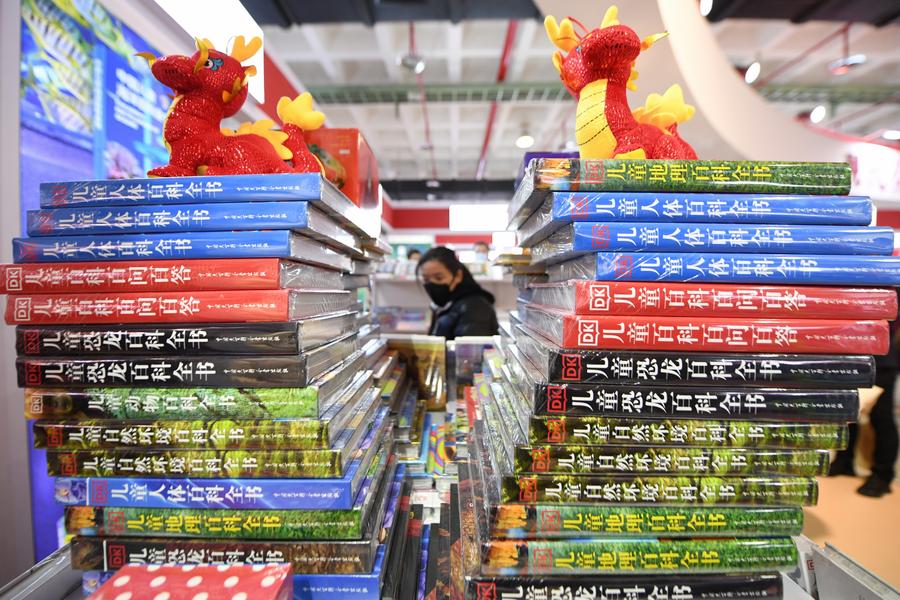
On Douyin, China's most popular video-sharing platform, a program dedicated to exploring essential science books has gained millions of views and attracted nearly 90,000 loyal viewers in just two years. Every week, esteemed scientists and scholars are invited to appear on the program to share their insight into books ranging from Euclid's Elements and Darwin's On the Origin of Species, to Hawking's A Brief History of Time.
Program planner Wu Guosheng says that his goal is to ignite public interest in science and foster the participation of both scientists and the public.
"We do not encourage people to engage with classic science books for academic purposes, but rather to make the experience of reading about science captivating, enlightening and rewarding," says Wu, who is dean of the Department of the History of Science at Tsinghua University.
He and his team have promoted nearly 100 classic texts on social media since 2022.
READ MORE: Chinese sci-fi masterpiece gains huge fan base overseas
In the past, people preferred to read literary classics rather than scientific texts, and science books always received a lukewarm response. However today, China values sci-tech innovation, and there is growing enthusiasm for scientific literature.
According to data released by Beijing-based industry research company OpenBook, the science book market share has increased consistently since 2019. Despite an overall decline in book sales during the COVID-19 pandemic, there was a significant surge in the popularity of books about medicine and health.
A similar trend is also evident among children's books, which account for the largest portion of the domestic book market. Since 2021, sales of science books for young readers have surpassed those of children's literature.
The upward trend is partly attributable to the fact that increasing numbers of experts are willing to share their knowledge through books, says Wang Dapeng, a member of the China Research Institute of Science Popularization.
Tan Xianjie, a 54-year-old gynecologist, is one such contributor. He has written a series of books and created short videos about women's health issues.
The doctor once received a thank-you flag from one woman at his hospital who was not his patient. After watching his lecture on cervical cancer, she booked an examination and after being diagnosed with early-stage cancer, underwent surgery.

The experience reminded Tan of the importance of popularizing science, which he says is "both a professional duty and a social responsibility for doctors".
When he began, the practice was not common among Chinese doctors. Hospital evaluation systems did not consider the popularization of science to be as important as the quality of surgery and patient numbers, and so the practice did not contribute significantly to a doctor's professional reputation.
In 2016, national leaders recognized the importance of science popularization in a significant shift, describing scientific innovation and popularization as "the wings of the realization of innovation-driven development". Subsequently, government plans were implemented to underscore the necessity of strengthening the writing of books about science.
The popularity of science literature is also being boosted by the country's rapid sci-tech development. Recent advancements in biomedicine, aerospace, astronomy, artificial intelligence and information technology have sparked waves of public enthusiasm for science, and have injected new vitality into the publication and marketing of science books, says Xu Guoqiang, deputy editor-in-chief at the Beijing World Publishing Company.
This year, the company is releasing a series of popular astronomy books that will cover topics such as the moon and Mars.
"The public needs books to have a better understanding of the country's cutting-edge scientific achievements," says Xu, citing examples such as China's successful launch of a Mars rover and future plans for manned lunar landings.
Xu says that the development of popular science and the reading of its associated publications relies on scientific literacy. The latest data shows that 14.1 percent of citizens were scientifically literate in 2023, and the country aims to raise that to 25 percent by 2035.
"Science popularization is a crucial means of enhancing scientific literacy, and in turn, enhancement will contribute to the prosperity of popular science," Xu says.
ALSO READ: Webb telescope captures 'stunning' images of 19 spiral galaxies
Imported science books have long been competitive on the domestic market, with a typical example being Stephen Hawking's A Brief History of Time, which has never left China's Top 10 list of popular science books since it was introduced here in 1992.
Well-known Chinese popular science books include the 1960s children's book series One Hundred Thousand Whys, the biographical Goldbach Conjecture, and the late-1970s science fiction book Little Smarty Travels to the Future. In recent years, books on genetics and quantum physics have also gained popularity with Chinese readers.
"But the problem we are facing now is there is still a shortage of Chinese science books, and a lack of books that spark readers' intelligence, curiosity and inner strength," Xu says.
Wang agrees and suggests more incentives to encourage professional participation, such as through funding projects.
"It may also be helpful to provide training to science writers to sharpen their writing skills," Wang adds.


